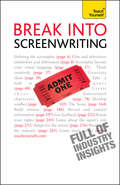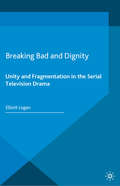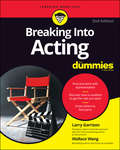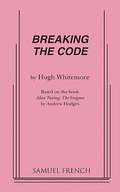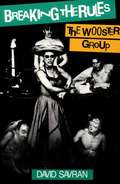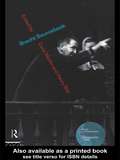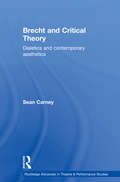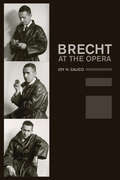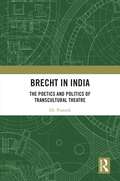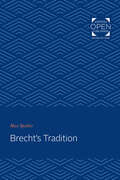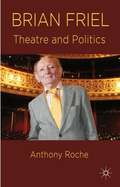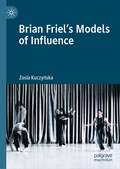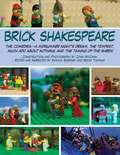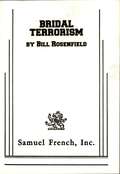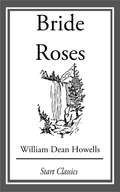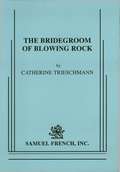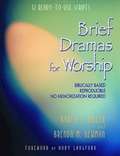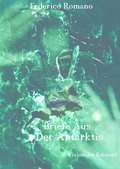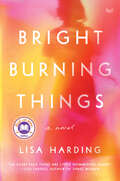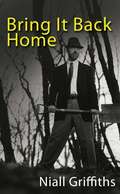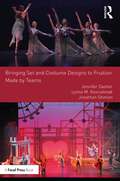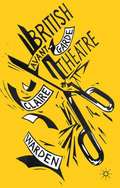- Table View
- List View
Break Into Screenwriting: Your complete guide to writing for stage, screen or radio
by Ray FrenshamThis is a comprehensive, jargon-free guide for all budding screenwriters. Its aim is not just to guide you through the techniques and skills you need to write for the screen (film and television), but also to give you guidance on how to approach the industry as a whole. Focusing on every aspect of screenwriting, from how to set about the writing process to how to develop your characters, plot and structure, this book will give you all the guidance you need to break into this highly competitive industry and make a career for yourself as a screenwriter.NOT GOT MUCH TIME?One, five and ten-minute introductions to key principles to get you started.AUTHOR INSIGHTSLots of instant help with common problems and quick tips for success, based on the author's many years of experience.TEST YOURSELFTests in the book and online to keep track of your progress.EXTEND YOUR KNOWLEDGEExtra online articles at www.teachyourself.com to give you a richer understanding of screenwriting.FIVE THINGS TO REMEMBERQuick refreshers to help you remember the key facts.TRY THISInnovative exercises illustrate what you've learnt and how to use it.
Break into Screenwriting: Your complete guide to writing for stage, screen or radio (TY Creative Writing)
by Ray FrenshamThis is a comprehensive, jargon-free guide for all budding screenwriters. Its aim is not just to guide you through the techniques and skills you need to write for the screen (film and television), but also to give you guidance on how to approach the industry as a whole. Focusing on every aspect of screenwriting, from how to set about the writing process to how to develop your characters, plot and structure, this book will give you all the guidance you need to break into this highly competitive industry and make a career for yourself as a screenwriter.NOT GOT MUCH TIME?One, five and ten-minute introductions to key principles to get you started.AUTHOR INSIGHTSLots of instant help with common problems and quick tips for success, based on the author's many years of experience.TEST YOURSELFTests in the book and online to keep track of your progress.EXTEND YOUR KNOWLEDGEExtra online articles at www.teachyourself.com to give you a richer understanding of screenwriting.FIVE THINGS TO REMEMBERQuick refreshers to help you remember the key facts.TRY THISInnovative exercises illustrate what you've learnt and how to use it.
Breaking Bad and Dignity: Unity and Fragmentation in the Serial Television Drama (Palgrave Close Readings in Film and Television)
by Elliott LoganAn ambitious interpretation of the critically celebrated and widely popular crime drama Breaking Bad , this book argues that not only should the series be understood as a show that revolves around the dramatic stakes of dignity, but that to do so reveals - in new ways - central aspects of serial television drama as an art form.
Breaking into Acting For Dummies (For Dummies Ser.)
by Wallace Wang Larry GarrisonUnderstand the business side of your showbiz career We all know acting can be a glittering whirl of glamour—plush red carpets, simply divine outfits, huge sums of money, and oh, the parties! But what a lot of wannabe actors forget is that it takes a lot of practical work to get to the flashbulbs of your first premiere, and that the savviest actors put as much stress on the business side of the profession as they do on the show. Breaking Into Acting For Dummies demystifies the behind-the-curtain side of showbiz to help you understand how it really works, who the decision-makers are, what they’re looking for when they’re picking talent, and how to get them on your side. If you truly want to be the next Emma Stone or Leonardo DiCaprio, you’ll want to have a well-thumbed copy of this book alongside your pile of scripts. Written by two friendly insiders, this guide takes you behind the scenes to help you map out your plan of attack, showing you how to open doors—and keep them open—and use your time wisely, so you’re not breaking a leg rushing from one random audition to another. You’ll understand how to flesh out your professional persona as thoroughly as a movie part, craft your resume as minutely as a script, and judge the angle of your headshots and webcam appearances as intimately as any director. Once you’ve mastered these skills, it’s time to go to market as your own publicity department, building your media and online presence until everyone who’s anyone knows exactly who you are. Understand different acting markets—from theater to commercials Network in-person and online Build your image via resumes, head shots, and webcam Keep a firm grip on the financial side Whether you’re studying, a hopeful amateur, or have been treading the boards for a while, this is your breakthrough script for succeeding in the business of acting, and for learning how to play your ultimate role: yourself.
Breaking the Code
by Hugh WhitemoreDerek Jacobi took London and Broadway by storm in this exceptional biographical drama about a man who broke too many codes: the eccentric genius Alan Turing who played a major role in winning the World War II; he broke the complex German code called Enigma, enabling allied forces to foresee German maneuvers. Since his work was classified top secret for years after the war, no one knew how much was owed to him when he was put on trial for breaking another code the tab.
Breaking the Rules
by David Savran Peter SellarsThrough interviews and descriptions of methodology, Breaking the Rules captures the essence of major works by the internationally acclaimed avant-garde company.
Brecht Sourcebook (Worlds of Performance)
by Henry Bial Carol MartinBertolt Brecht is one of the most prolific and influential writer-directors of the twentieth century. This fascinating anthology brings together in one volume many of the most important articles written about Brecht between 1957 and 1997. The collection explores a wide range of viewpoints about Brecht's theatre theories and practice, as well as including three plays not otherwise available in English: The Beggar or The Dead Dog, Baden Lehrstuck and The Seven Deadly Sins of the Lower Middle Class. Editors Martin and Bial have brought together a unique compendium which covers all the key areas including: * the development of Brecht's aesthetic theories * the relationship of Epic theatre to orthodox dramatic theatre * Brecht's collaboration with Kurt Weill, Paul Dessau and Max Frisch * Brecht's influence on a variety of cultures and contexts including England, Italy , Moscow and Japan. Together these essays are an ideal companion to Brecht's plays, and provide an invaluable reconsideration of Brecht's work. Contributors include: Werner Hecht, Mordecai Gorelik, Eric Bentley, Jean-Paul Sartre, Kurt Weill, Ernst Bloch, Darko Suvin, Carl Weber, Paul Dessau, Denis Calandra, W. Stuart McDowell, Ernst Schmacher, Hans-Joachim Bunge, Martin Esslin, Artuto Lazzari, Tadashi Uchino, Diana Taylor, Elin Diamond, and Lee Baxandall.
Brecht and Critical Theory: Dialectics and Contemporary Aesthetics (Routledge Advances in Theatre & Performance Studies #2)
by Sean CarneyArguing that Brecht’s aesthetic theories are still highly relevant today, and that an appreciation of his theory and theatre is essential to an understanding of modern critical theory, this book examines the influence of Brecht’s aesthetic on the pre-eminent materialist critics of the twentieth century: Louis Althusser, Walter Benjamin, Roland Barthes, Frederic Jameson, Theodor W. Adorno and Raymond Williams. Re-reading Brecht through the lens of post-structuralism, Sean Carney asserts that there is a Lacanian Brecht and a Derridean Brecht: the result of which is a new Brecht whose vital importance for the present is located in decentred theories of subjectivity. Brecht and Critical Theory maps the many ways in which Brechtian thinking pervades critical thought today, informing the critical tools and stances that make up the contemporary study of aesthetics.
Brecht at the Opera (California Studies in 20th-Century Music #9)
by Joy H. CalicoFrom an award-winning author, the first thorough examination of the important influence of opera on Brecht’s writings.Brecht at the Opera looks at the German playwright's lifelong ambivalent engagement with opera. An ardent opera lover in his youth, Brecht later denounced the genre as decadent and irrelevant to modern society even as he continued to work on opera projects throughout his career. He completed three operas and attempted two dozen more with composers such as Kurt Weill, Paul Hindemith, Hanns Eisler, and Paul Dessau. Joy H. Calico argues that Brecht's simultaneous work on opera and Lehrstück in the 1920s generated the new concept of audience experience that would come to define epic theater, and that his revisions to the theory of Gestus in the mid-1930s are reminiscent of nineteenth-century opera performance practices of mimesis.
Brecht in India: The Poetics and Politics of Transcultural Theatre
by PrateekBrecht in India analyses the dramaturgy and theatrical practices of the German playwright Bertolt Brecht in post-independence India. The book explores how post-independence Indian drama is an instance of a cultural palimpsest, a site celebrating a dialogue between Western and Indian theatrical traditions, rather than a homogenous and isolated canon. Analysing the dissemination of a selection of Brecht’s plays in the Hindi belt between the 1960s and the 1990s, this study demonstrates that Brecht’s work provided aesthetic and ideological paradigms to modern Hindi playwrights, helping them develop and stage a national identity. The book also traces how the reception of Brecht was mediated in India, how it helped post-independence Indian playwrights formulate a political theatre, and how the dissemination of Brechtian aesthetics in India addressed the anxiety related to the stasis in Brechtian theatre in Europe. Tracking the dialogue between Brechtian aesthetics in India and Europe and a history of deliberate cultural resistance, Brecht in India is an invaluable resource for academics and students of theatre studies and theatre historiography, as well as scholars of post-colonial history and literature.
Brecht's Tradition
by Max SpalterOriginally published in 1967. Literary scholars often acknowledge that Brecht borrowed from a variety of traditions, including Goethe, Schiller, expressionists, naturalists, and realists, all of whom affected his work. However, they tend not to address any single tradition as exclusively Brecht's. From these various literary traditions, Brecht borrowed formal elements only; compared with other writers to whom he is indebted, Brecht exceeds them in cynicism. They do not convey anything like his pitiless debunking attitude, his corrosive anti-romanticism, his hardheaded refusal to idealize or glorify, and his suspicion of all sentimentalities. This book discusses what the author identifies as the "Brechtian sensibility." Chroniclers of drama have not totally ignored the Brechtian tradition, but too often they are content to note merely that Brecht shared with some writers—particularly Büchner and Wedekind—a proclivity for open drama and episodes of racy realism tinged with poetic feeling. Other critics have not closely studied the various plays of this tradition in order to show how they constitute a distinctive and well-defined species of theater to which Brecht unmistakably belongs.
Brian Friel
by Anthony RocheFriel is recognised as Ireland's leading playwright and due to the ability of plays like Translations and Dancing at Lughnasa to translate into other cultures he has made a major impact on world theatre. This study draws on the Friel Archive to deepen our understanding of how his plays were developed.
Brian Friel's Models of Influence
by Zosia KuczyńskaThe Brian Friel Papers at the National Library of Ireland are a record of a life’s work in progress. They represent a way of working and of making art over a period spanning more than fifty years. This book is the first of its kind in its attempt to interrogate the role of the Brian Friel Papers in Friel’s legacy as a working artist with a richly developed creative practice. By means of an unprecedented focus on Friel’s artistic process, Kuczyńska asks not only how and by whom Friel was being influenced and inspired, but also how and for whom Friel’s praxis might come to be an inspiration. Combining forensic archival scholarship with original, collaborative practice-based research, this study remains focused on the ‘how’ of influence, showcasing an approach to literary archives that foregrounds live practices of access in the spirit of creative encounter. Whether uncovering forgotten source materials for Friel’s plays or working with current practitioners in the arts, Kuczyńska reveals how an approach to literary archives grounded in artistic practice might provide the tools for setting a major creative legacy not in stone but rather in motion.
Brick Shakespeare: The Comedies - A Midsummer Night's Dream, The Tempest, Much Ado About Nothing, and The Taming of the Shrew
by Becky Thomas Monica Sweeney John McCannExplore four of Shakespeare’s comedies like never before-with LEGO bricks! This book presents Shakespeare’s most delightful comedies, A Midsummer Night’s Dream, Much Ado About Nothing, The Taming of the Shrew, and The Tempest, in one thousand amazing color photographs. This unique adaptation of the world’s most famous plays stays true to Shakespeare’s original text, while giving audiences an exciting new perspective as the stories are retold with the universally beloved construction toy.Get caught up in hilarious misadventures as brick Puck leads the lovers astray through the brick forests of Athens. Watch Cupid kill with traps in the plot to marry Beatrice and Benedict. Marvel at the changing disguises of the men vying for brick Bianca’s affections, and feel the churn of the ocean as Prospero sinks his brother’s ship into the brick sea. These iconic stories jump off the page with fun, creative sets built brick by brick, scene by scene!This incredible method of storytelling gives new life to Shakespeare’s masterpieces. With an abridged form that maintains original Shakespearean language and modern visuals, this ode to the Bard is sure to please all audiences, from the most versed Shakespeare enthusiasts to young students and newcomers alike!
Bridal Terrorism
by Billy RosenfieldComedy / 3m, 3f / Simple exterior Lionel anticipates a quiet afternoon in the park. Just as he settles on a bench with a book, an armed woman in a wedding gown approaches with her bridal retinue. May has booked the church and the reception hall. All she needs is a groom and Lionel looks like a good prospect. He is not keen on the idea but May and her wedding party are persistent. Lionel eventually gives in, but May has second thoughts when he discloses that he lives in an institution and has only been allowed out for the afternoon. The wedding party huddles and the bride's mother proposes they head for the reservoir to find a better groom. Lionel, happy his ruse was effective, picks up his book.
Bride Roses: A Scene
by William Dean HowellsA Lady, entering the florist's with her muff to her face, and fluttering gayly up to the counter, where the florist stands folding a mass of loose flowers in a roll of cotton batting: "Good-morning, Mr. Eichenlaub! Ah, put plenty of cotton round the poor things, if you don't want them frozen stiff! You have no idea what a day it is, here in your little tropic." She takes away her muff as she speaks, but gives each of her cheeks a final pressure with it, and holds it up with one hand inside as she sinks upon the stool before the counter.
Bridegroom of Blowing Rock
by Catherine TrieschmannSet at the end of the Civil War in a town with split loyalties, this play weaves humor and mythology into a story about women who must find ways to keep hearth and home together in the absence of "full bodied" men. Focus is on the fracture that occurs in one family when a blind daughter is seduced by a Union raider with extraordinary storytelling abilities, much to the dismay of her staunchly Confederate mother. <P><P> Winner of the L. Arnold Weissberger Award.
Brief Dramas for Worship: 12 Ready-to-Use Scripts
by Karen F. Miller Brenda M. NewmanBrief Dramas for Worship provides dramas that are suitable for both contemporary and traditional worship services. They are appropriate for use instead of a sermon, or as the sermon. Included are questions and comments to use in a discussion following the service so that key insights from the biblical drama can be emphasized. The scripts do NOT require memorization. Each drama includes extensive "helps" which identify possible sets, simple costumes, and a detailed worship outline, including hymn and praise song suggestions, original prayers, etc. These production notes provide effective, professional presentation instructions. Permission is granted to reproduce scripts for use in congregational settings. Most of these biblically-based dramas offer a woman's point of view about a scripture story or a scripture message. Some of the "main characters" are biblical people and others are contemporary people. Dramas include: The Bethlehem Child; Margaret, a Grieving Mother Yearns for Her Wayward Son (Hosea 11:1); Bath Sheba and David; Lydia, Pilate's Wife; Martha, Prescription for Peace; Caroline: A Waitress Receives the Living Water; Eli's Wife: A Husband's Tale Brings Hope for Peace; and, Mattie May: A Mountain Woman's Tale of Gracious Plenty.
Briefe aus der Antarktis
by Federico RomanoDie Lebensreise eines selbstlosen und großzügigen Mannes durch Schmerz, Freude, Freundschaft, Liebe und Tod. "Briefe aus der Antarktis" Die Lebensreise eines selbstlosen und großzügigen Mannes durch Schmerz, Freude, Freundschaft, Liebe und Tod. Das ist "Briefe aus der Antarktis", Ein Roman, der auf einer Insel der Fantasie spielt, die mehr ein Ort der menschlichen Seele ist.Die menschliche Seele, die hier erzählt wird, ist Frederik Jonson. Seine Begegnungen, die harten Lebenserfahrungen, mit denen er fertig werden kann und mit denen er fertig werden kann, machen sein Leben von Anfang an zunichte. Er wurde von der Mutter verlassen, die er nie wieder sehen wird. Aber es ist genau der Traum der Mutter, die Sie noch nie getroffen hat, dass Sie sich ständig formt, dass sie für die, die sie braucht, "Mutter" wird, bis zum letzten Tag ihres Lebens, wenn Sie Ihr Baby holt, um es auf die letzte und wichtigste Reise zu bringen. Beispieltext: Die Lebensreise eines selbstlosen und großzügigen Mannes durch Schmerz, Freude, Freundschaft, Liebe und Tod. Das ist "Briefe aus der Antarktis", Ein Roman, der auf einer Insel der Fantasie spielt, die mehr ein Ort der menschlichen Seele ist. Die menschliche Seele, die hier erzählt wird, ist Frederik Jonson. Seine Begegnungen, die harten Lebenserfahrungen, mit denen er fertig werden kann und mit denen er fertig werden kann, machen sein Leben von Anfang an zunichte.
Bright Burning Things: A Novel
by Lisa HardingA READ WITH JENNA BOOK CLUB PICK AS FEATURED ON TODAY * A PEOPLE MAGAZINE PICK * AN INDIE NEXT PICK * A LIBRARYREADS PICK *AN AMAZON EDITORS PICK “On every page there are little shimmering bombs. Like Room, where parenthood is at once your jail and your salvation, it is almost claustrophobic—but in the most glorious way.”—Lisa Taddeo, #1 New York Times bestselling author of Three Women and AnimalA rising international literary star makes her American debut with this visceral, tender, and brave portrait of addiction, recovery, and motherhood, as harrowing and intense as Shuggie Bain.Sonya used to perform on stage. She used to attend glamorous parties, date handsome men, ride in fast cars. But somewhere along the way, the stage lights Sonya lived for dimmed for good. In their absence, came darkness—blackouts, empty cupboards, hazy nights she can't remember.What keeps Sonya from losing herself completely is Tommy, her son. But her immense love for Tommy is in fierce conflict with her immense love of the bottle. Addiction amplifies her fear of losing her child; every maternal misstep compels her to drink. Tommy’s precious life is in her shaky hands. Eventually Sonya is forced to make a choice. Give up drinking or lose Tommy—forever.Bright Burning Things is an emotional tour-de-force—a devastating, nuanced, and ultimately hopeful look at an addict’s journey towards rehabilitation and redemption.A MOST ANTICIPATED BOOK FROM: Washington Post, The Millions, PopSugar, Shondaland, Good Morning America, Nylon, Good Housekeeping, Town & Country
Brighton Beach Memoirs
by Neil SimonFourteen-year-old Eugene is preoccupied by his passion for the Yankees and his lust for his beautiful cousin, Nora. Eugene's comic growing pains contrast with the darker issues troubling his family: poverty, illness and the growing Nazi threat to relatives in Europe.
Bring it Back Home (Quick Reads Ser.)
by Niall GriffithsChased by a hit-man, a young man returns home from London to a small town in Wales. Reconciliation with his family is alternated with his pursuer’s progress. A long criminal connection is revealed but can he escape the sins of his fathers? This is a tense, tightly written drama that will captivate the reader with fast, gut-wrenching action.
Bring it Back Home (Quick Reads)
by Niall GriffithsChased by a hit-man, a young man returns home from London to a small town in Wales. Reconciliation with his family is alternated with his pursuer’s progress. A long criminal connection is revealed but can he escape the sins of his fathers? This is a tense, tightly written drama that will captivate the reader with fast, gut-wrenching action.
Bringing Set and Costume Designs to Fruition: Made by Teams
by Jennifer Dasher Lynne M. Koscielniak Jonathan ShimonBringing Set and Costume Designs to Fruition: Made by Teams dives into the collaborative working relationships between set and costume designers with their technical counterparts throughout the theatrical production process, from concept to execution. Set and costume designers render environments and characters for a wide array of performative events; skilled artisans and technologists bring these visions to life. This book explores the dynamic between those who decide what the set and costumes should look like and those who make them work, including scene designers, costume designers, scene shops, and costume shops. The book discusses how to identify resources, ask the right questions, and engage in healthy collaborations. Following these fundamentals are practical activities and interviews with industry professionals that demonstrate how these skills can be applied to a broad range of productions and other avenues for creative design and production. Bringing Set and Costume Designs to Fruition is written for emerging professionals in set and costume design, as well as students in courses across a theatre degree program, including stagecraft, costume construction, scene design, and introduction to theatrical design and production.
British Avant-Garde Theatre
by Claire WardenThis book explores an under-researched body of work from the early decades of the twentieth century, connecting plays, performances and practitioners together in dynamic dialogues. Moving across national, generational and social borders, the book reads experiments in Britain during this period alongside theatrical innovations overseas.
